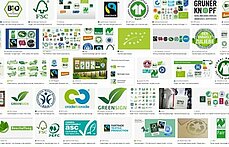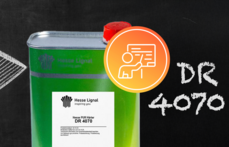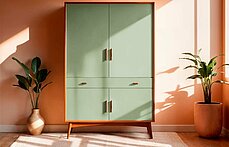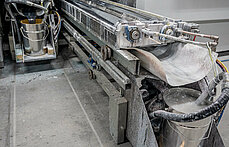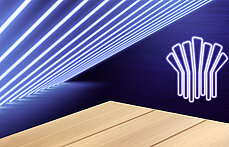
PU-Isolating Filler DP 4791-9343
DP 4791-9343 is a Decopaint compliant PU Isolation primer for the greatest isolation effect and quality demands. This product is perfectly suited for use beneath Hesse high gloss lacquers and in wet rooms. Our PU Isolation primer can be used as an adhesion primer on a wide variety of plastics due to its excellent bonding properties.
Enquire articlePage content
- very good body and perfect sanding properties
- excellent ability to stay on vertical surfaces beneath high gloss
- extremely wide range of applications
- can be used as an adhesion primer for plastic
- Decopaint compliant
Processing
Areas of application
DP 4791-9343 can be used as a PU Isolation primer for shopfitting and all interior fixtures and fittings, including in kitchens and bathrooms as well as the fitting out of ship interiors.
Technical information
Sustainability data sheet
Certificates
Technical Specifications
| Proportion of renewable raw materials % | 0 % |
|---|---|
| Appearance | opaque |
| VOC EU % | 34 % |
| Number of layers (max) | 4 |
| Quantity per layers (min) | 140 g/m² |
| Quantity per layers (max) | 300 g/m² |
| Total quantity applied | 800 g/m² |
| Mixing ratio (volumetric) | 4 : 1 | Hardener: DR 4058 |
| Mixing ratio (gravimetric) | 100 : 18 | Hardener: DR 4058 |
Processing Instructions
| Potlife | 2 h / 20 °C |
|---|---|
| Drying | 5 h / 20 °C |
| Due to hardening | 7 d / 20 °C |
| Stackable according to | 16 h / 20 °C |
| Surface sanding (grain size) | 150 - 320 |
| Intermediate sanding (grain size) | 320 - 400 |
| Yield per pass | 5 - 10 m²/l |
| Processing information | The maximum application amount in wet film when used as a flame-retardant coating material for seagoing vessels totals 140 g/m². |
| Special notes | When used as a coating material with low flame-spread characteristics complying with SOLAS 74 Reg. II-2/3, II-2/5, II-2/6 and X/3, as amended, IMO Resolution MSC.36(63)-(1994 HSC-Code) 7, IMO Resolution MSC.97(73)-(2000 HSC-Code) 7, IMO MSC/Circ. 1120, this product must only be combined with other approved and technically matching products.For MDF substrates: With MDF coatings, you can avoid painting faults and edge breaks if you observe the following: Selection of an MDF quality suitable for the field of application, see manufacturer data on EU standard EN 622-5 pt.4 Test methods EN 317 (requirements on thickness swelling). Ideal panel moisture 5 - 7 %. If possible coat the MDF all around, the backs should at least receive a clear coating. Avoid sharp edges and milling grooves, round-off wherever possible. Coat edges and milling grooves 2 x with primer, do not sand through, if need be, prime again. Thick boards that have been built by gluing together several thinner boards are, due to the variance in tension, susceptible to edge ridging. It is better to select a single MDF board of the appropriate thickness. Panels that have been glued together should always be sanded flat at the edges and colourlessly pre-insulated. Any water introduced by the gluing process must be allowed to evaporate prior to coating. Store filler-coated surfaces in an air conditioned location and apply the final coat in a timely manner.“A risk assessment was undertaken according to Directive 2014/90/EU, Annex II, Section 3. This coating does not pose a physical risk to health nor a risk to the environment when cured and dried.” |
Procedure example
Our technical information is continually adapted to keep up to date with the latest technology and statutory regulations. The latest version is always available online at www.hesse-lignal.de or talk to your local account manager. This information is for advice and is based on the best knowledge available and careful research in line with the current state of the art. This information cannot be held as legally binding. We also refer you to our terms and conditions of business. Safety data sheet is provided in accordance with EC regulation no. 1907/2006.

